|
Click to listen to this article
|
While organic production can help farmers gain access to new markets, improve soil and increase profits, the transition process can be both challenging and risky.
Sustainable Agriculture Research & Education’s (SARE) newest bulletin, Transitioning to Organic Production, explains how many farmers adopt organic production to increase profits while improving the resilience and environmental impact of their production systems. Long-term success requires patience, flexibility, good record-keeping and a commitment to stewardship.
The new publication lays out basic transition strategies for livestock, field crop and horticultural systems, including a summary of the certification process and the National Organic Program standards. Practices common to all organic systems are also addressed, including:
- crop rotation
- cover cropping
- addition of organic fertility sources
- disease prevention
- integrated pest and weed management
- conservation tillage

